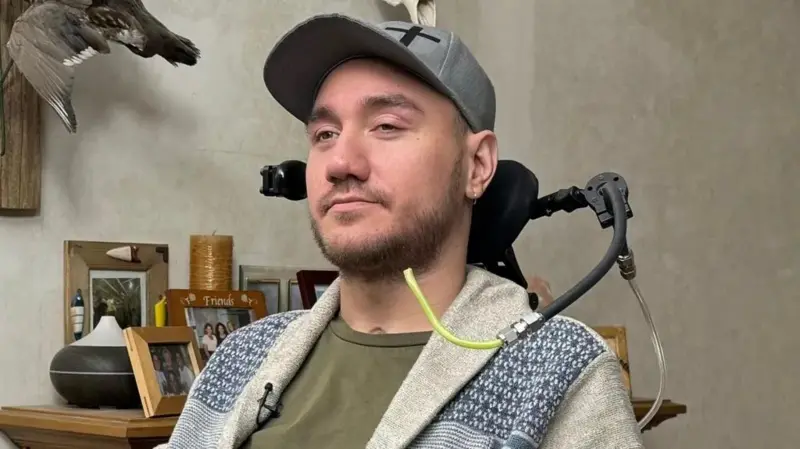Imagine having a chip implanted in your brain that translates your thoughts into computer commands. This concept, once confined to science fiction, has now become a reality for Noland Arbaugh, thanks to Brain-Computer Interface Technology.
After being paralyzed for eight years, 30-year-old Noland Arbaugh became the first person in January 2024 to receive a chip implant from the American neurotechnology company Neuralink. While similar chips have been developed by other companies, Neuralink has drawn significant attention, largely due to its founder, Elon Musk. However, Noland emphasizes that the real story is not about Musk or himself, but rather the advancement of Brain-Computer Interface Technology.
Speaking to the BBC, Noland acknowledged the risks associated with implanting a chip in the brain but expressed his willingness to contribute. “Whether the outcome is good or bad, I just want to help,” he said. If successful, he aims to support Neuralink’s research, and if complications arise, the company will have an opportunity to learn and improve Brain-Computer Interface Technology.
From Losing Control to Regaining Independence
Originally from Arizona, Noland’s life took a drastic turn in 2016 when a diving accident left him paralyzed from the shoulders down. The loss of mobility meant that he had no control over his body, raising significant concerns about privacy and autonomy.
“You lose all control over your life, and with that, privacy also disappears. That’s the hardest part,” he shared. He had to adjust to complete dependence on others for even the simplest tasks.
Now, Brain-Computer Interface Technology has given him a level of independence by allowing him to control a computer using his mind. This chip, also known as a Brain-Computer Interface (BCI), detects tiny electrical signals generated when a person thinks about movement. These signals are then translated into digital commands, enabling interaction with technology in ways previously unimaginable.
A Groundbreaking but Controversial Advancement
For decades, scientists have worked on Brain-Computer Interface Technology, but Elon Musk’s involvement has brought unprecedented attention to the field. While it has attracted significant investment, concerns over safety and ethical implications have also surfaced.
When Neuralink announced Noland’s implant, experts hailed it as a milestone but also warned of potential risks. Musk has provided limited details about the chip’s performance but stated in a social media post that early results showed promising neural activity.
Noland recalled his interactions with Musk before and after the surgery. “I think he was as excited about this as I was,” he said. However, he insists that Brain-Computer Interface Technology is bigger than any one person, including Musk. With Musk’s growing influence in the U.S. government, questions remain about how the global community perceives this development.
Despite these debates, there is no denying the profound impact this device has had on Noland’s life.
The Future of Thought-Controlled Computing
When Noland regained consciousness after surgery, he was informed that he could control an on-screen cursor simply by thinking about moving his fingers. “I didn’t know what to expect—it felt like something out of a sci-fi movie,” he admitted.
Surrounded by Neuralink engineers, he watched as his brain’s neural signals appeared on a screen, confirming the device was working. Over time, his control over the implant improved to the point where he could now play chess and video games.
“I grew up playing video games, but after my accident, I had to give them up. Now, thanks to Brain-Computer Interface Technology, I can compete with my friends again—and even beat them!” he said.
Noland’s case demonstrates the transformative potential of Brain-Computer Interface Technology, but experts warn that privacy concerns cannot be ignored.
Privacy in the Age of Brain Technology
Professor Anil Seth, a neuroscientist at the University of Sussex, raised concerns about privacy implications. “If we can export brain activity, we are not just sharing what we do but potentially what we think, believe, and feel,” he told the BBC.
“When you grant access to your brain, very little remains private,” he added. Despite these concerns, Noland remains focused on what Brain-Computer Interface Technology can achieve rather than the risks involved.
He hopes that in the future, this technology will allow him to control his wheelchair or even a humanoid robot. However, in its current state, the technology is still evolving and has its limitations.
The Challenges of a Revolutionary Technology
At one point, a malfunction in the device temporarily disconnected Noland from his computer. “It was frustrating—I didn’t know if I would be able to use Neuralink again,” he said. Engineers later adjusted the software and restored the connection, highlighting the challenges in perfecting Brain-Computer Interface Technology.
Many companies are racing to refine this field. Synchron, another neurotechnology firm, has developed a device called Stentrode, designed to help people with motor neuron diseases. Unlike Neuralink’s chip, which requires open-brain surgery, Stentrode is implanted through the jugular vein and guided into the brain via blood vessels.
Like Neuralink’s device, Stentrode integrates with the brain and translates neural signals into digital commands. “It activates when someone thinks about moving their fingers, even if they physically can’t,” explained Synchron’s Chief Technology Officer, Ricky Banerjee.
One user, Mark, who chose not to disclose his last name, described how the device allowed him to interact with Apple’s Vision Pro headset, offering virtual experiences he could never access before. “It let me visit places like Australia’s waterfalls and New Zealand’s mountains—all from my home,” he said.
“I see a future where Brain-Computer Interface Technology will truly change lives, especially for people who are completely paralyzed,” Mark added.
A New Era of Human-Technology Interaction
Noland has committed to a six-year study as part of his Neuralink implant trial. Whatever the outcome, he believes this is just the beginning of a technological revolution that will soon become mainstream.
“We still know so little about the brain despite decades of research. But Brain-Computer Interface Technology is opening up new doors and allowing us to learn more than ever before,” he said.
As technology advances, the future promises more sophisticated implants, greater independence for people with disabilities, and new ethical debates about privacy and control in the digital age.
NEWS SOURCE: BBC NEWS





